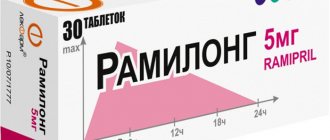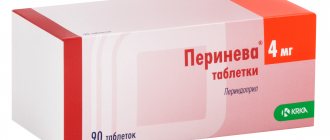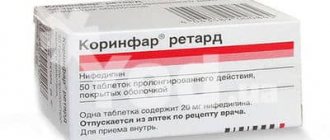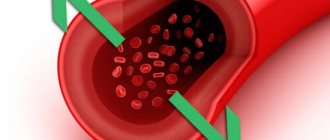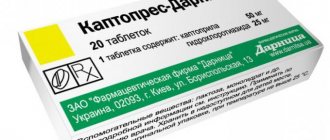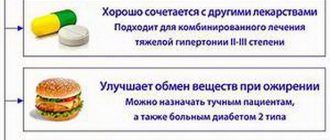Dizziness and headaches are often associated with increased blood pressure. To stop an attack, including relieving the symptoms of a hypertensive crisis, you can use inexpensive Dibazol tablets or injections. This is one of the most affordable medications that can be taken by both adults and children.
Description of the drug
These patients, who are hearing the drug “Dibasol” for the first time, are interested to know what case is prescribed, whether it increases or decreases blood pressure? "Dibasol" is used for arterial hypertension. The drug works on the walls of blood vessels. As a result, blood pressure levels decrease.
After taking the drug or injection, there is:
- Dilation of blood vessels, which accelerates blood flow and oxygen supply to tissues;
- activation of the spinal cord and brain;
- lowering the lower and upper limits of blood pressure;
- weakening of the smooth muscles of internal organs;
- Production of interferon (hence, the drug has an immunostimulatory effect).
Improvement after taking the tablet is observed within 30-40 minutes after injection for 17 minutes. The effect of the drug is maintained for 3.5 hours.
How does the drug affect the body?
Bendazole has a complex effect:
- preventing spasms;
- expansion of the walls of blood vessels;
- short-term decrease in pressure;
- myotropic effect;
- decreased smooth muscle tone;
- increased blood flow to myocardial cells suffering from a lack of oxygen (this is especially common in coronary artery disease);
- strengthening the immune system by stimulating the production of interferon (in this sense, the effect of the drug is similar to the therapeutic effect of Levamisole).
The active component also improves contact between neuron synapses in the tissues of the spinal cord. Therefore, it is also used to treat nervous system disorders.
The components of the drug are well absorbed in the walls of the gastrointestinal tract. The therapeutic effect begins 30-60 minutes after administration and lasts for 2-3 hours. The drug is mainly excreted in the urine, and to a small extent in the feces.
Release forms
Dibasol is available in tablet form and as a solution in injection ampoules.
Tablets contain 20 mg of active ingredient. Special tablets for children in doses ranging from 2 to 4 mg are also available. There is a blister containing 10 tablets in a cardboard package. The number of bubbles can be from two to four parts.
A clear, flavored injection solution available in 5 mg ampoules. 1 ml of solution contains from 5 to 10 mg of benzene. One package contains 10 ampoules.
Buy "Dibazol": price, analogues, reviews
You can buy the drug in pharmacies with a doctor's prescription. The product is sold at an affordable price - 50-70 rubles per pack of 10 tablets. For about the same amount you can buy injections - 10 ampoules of 1 ml.
Analogues of the product include Oxibral and Halidor. Judging by the reviews, Dibazol is highly effective - it is recommended by more than 90% of patients. Among the advantages are the affordable price, the absence of side effects, and a tangible effect. However, they note that the drug cannot be used for a long time by older people.
Composition of "Dibazol"
The active substance is Benzazole. The drug contains auxiliary components in the form of purified microchloride, milk sugar, potato starch, food additives and emulsifiers. All ingredients are safe, they do not cause allergies, they are responsible for a homogeneous composition and enhance the work of the main substance.
Additional components of the injection solution are: hydrogen chloride, which accelerates the absorption process of all components and liquid for preparing the injection solution.
Indications for use
The drug is prescribed in the following cases:
- in case of persistent or interrupted high blood pressure;
- relieve arterial hypertension;
- Elimination of muscle contractions;
- Used in some pathologies of the nervous system, which leads to sensitivity disorders.
The drug helps reduce high blood pressure, eliminate contractions and reduce clear pain. Dibazol is recommended for use not only in cases of high blood pressure. This can be prescribed to prevent viral diseases and increase the body's resistance to adverse factors.
Instructions for use
The dosage of “dibazole” depends on the form of release, diagnosis, severity of the disease and the age of the patient.
The solution can be injected into a vein or into a muscle. In case of high blood pressure, the course of treatment is 10-14 days. The dose is 2-3 ml. The intramuscular injection can be given three times daily.
A crisis of excess pressure is accompanied by such unpleasant and dangerous symptoms as dizziness, severe headaches, nausea and even vomiting, visual and motor coordination disorders. In such emergency situations, the drug is administered intravenously, but only by medical personnel. The maximum dose is 5 ml. The solution should be administered evenly and slowly, monitoring the patient's condition.
"Dibasol" in the form of pressure tablets is prescribed for children aged 12 years and older. The maximum daily dose is 150 mg, divided into three doses. You should not take more than 50 mg of the active substance at one time. The tablet should be swallowed completely, without chewing, while sipping plenty of water, two hours before meals.
Dibazol
Registration number: P N003623/01
Trade name of the drug: Dibazol.
International nonproprietary name: Bendazol.
Dosage form: Tablets.
Composition per tablet: Active substances:
- Dibazole - 0.02 g
Excipients - to obtain a tablet weighing 0.26 g:
- Refined sugar - 0.199 g
- Potato starch - 0.039 g
- Calcium stearate - 0.002 g
Description: Tablets are white or white with a slightly grayish or yellowish tint, flat-cylindrical with a bevel.
Pharmacological properties: Dibazol has vasodilating, antispasmodic and hypotensive effects, has a stimulating effect on the functions of the spinal cord, and helps restore the functions of peripheral nerves. It also has moderate immunomodulatory activity.
Pharmacotherapeutic group: Vasodilating agent.
ATS CODE: С04АХ
Indications for use: Dibazol is used as an adjuvant in the complex treatment of arterial hypertension.
Contraindications: Hypersensitivity to the drug, diseases occurring with increased muscle tone - convulsive syndrome. Use Dibazol with caution as an antihypertensive agent in elderly patients (decreased cardiac output).
Method of administration and dosage: Dibazol is used orally at 0.02 - 0.05 g (20 - 50 mg) 2 - 3 times a day for 3 - 4 weeks or shorter courses. Take Dibazol 2 hours before meals or 2 hours after meals.
Side effects: Dibazole is usually well tolerated. With a significant increase in dose - sweating, feeling hot, dizziness, headache, nausea, allergic reactions. When the dose is reduced or the drug is discontinued, these phenomena quickly disappear.
Interactions with other drugs: The hypotensive effect of bendazole is enhanced by its simultaneous use with antihypertensive drugs of other pharmacotherapeutic groups and diuretics. Bendazole prevents the increase in total peripheral vascular resistance caused by beta-blockers. Phentolamine enhances the hypotensive effect of bendazole.
Release form: Tablets, 0.02 g each. 10 pieces in blister or cellless packaging. One or two blister packs along with instructions for use are placed in a cardboard pack. It is allowed to place contour cellless packaging together with an equal number of instructions for use in a box made of cardboard.
Storage conditions: Store at a temperature not exceeding 25 °C. Keep out of the reach of children.
Shelf life: 5 years. Do not use after the expiration date stated on the package.
Conditions for dispensing from pharmacies: Without a prescription.
Contraindications
The drug should not be used in the following cases:
- individual intolerance to components;
- liver and kidney pathologies;
- ulcers of the stomach and duodenum;
- convulsive syndrome;
- arrhythmia, cardiac conduction disorders;
- diseases associated with decreased muscle tone;
- diabetes;
- tendency to hypotension.
The drug is prescribed to patients over 12 years of age. Under the strict supervision of a therapist and gynecologist, the drug is prescribed in each trimester of pregnancy, as well as during breastfeeding.
Contraindications and side effects
The medication is not used in cases where the patient has an individual intolerance to the main or additional components. The drug should be used with caution in the presence of the following diseases and disorders:
- diabetes;
- low pressure;
- ulcers of the gastrointestinal tract;
- severe forms of heart failure;
- decreased muscle tone;
- old age (short-term use is allowed in consultation with a doctor).
The drug is prescribed with caution to patients whose work requires a high concentration of attention (driving cars, moving machinery). In this case, you need to monitor your well-being - there may be a lack of coordination, as well as dizziness. If such signs appear, you should stop taking it and consult a doctor.
Side effects are rare. They are mainly associated with dysfunction of the left ventricle of the heart. However, the effect is minor and can only be recorded on an electrocardiogram. The following manifestations are also sometimes observed:
- allergic reaction;
- decreased blood pressure;
- dizziness;
- general weakness.
Overdose
If recommended doses are exceeded, overdose symptoms may occur. Possible increased body temperature, severe pain in any part of the head and sweating. Nausea and vomiting often occur. "Dibazol" in large doses quickly reduces blood pressure, complications arise.
In case of drug poisoning, it is manifested by drinking plenty of fluids, gastric lavage, as well as taking saline laxatives and enterosorbents (Smecta, Polysorb, activated carbon). Taking Dibasol has been stopped.
special instructions
During treatment, it is recommended to refrain from driving, as there is a high risk of dizziness.
Since Dibazol can affect ECG parameters, the drug is not prescribed to elderly patients.
During pregnancy, Dibazol can be prescribed for high blood pressure caused by gestosis or another disease, such as hyperthyroidism. The drug is not suitable for daily use; its use is indicated only in emergency cases.
The simultaneous use of Dibazol with drugs such as Clonidine, Reserpine, Phentolamine is not recommended due to a sharp drop in blood pressure.
The use of Dibazol with Papaverine is effective. These drugs complement each other and enhance each other's effects. The condition improves within 10-15 minutes.
Combination drugs with Dibazol
Combination drugs are widely used in medicine, including Dibazol:
- "Papazole" based on papaverine and dibazole, 30 mg. Prescribed for vascular spasms that slightly exceed normal blood pressure.
- "Theodibaverine" contains 20 mg of dibazole, 20 mg of papaverine and 15 mg of theobromine. It is prescribed for spasm of cerebral vessels.
- "Andipal" is produced on the basis of phenobarbital 20 mg, dibazol 20 mg and analgin 25 mg. The drug dilates blood vessels, eliminates smooth muscle spasms and reduces pain.
All drugs have the same mechanism of action on the body; they relieve spasms, dilate blood vessels and safely lower blood pressure.
What does Dibazol help with: indications
The drug can only be used in consultation with a doctor. Most often it is prescribed when spasms of smooth muscles occur in the walls of blood vessels. "Dibazol" is also used during an attack of hypertension. Other indications for use:
- cholecystitis;
- colic in the intestines;
- pancreatitis;
- facial paralysis;
- flaccid paralysis;
- poliomyelitis (to relieve mild manifestations in the last stages of treatment).
Dibazol tablets are used in cardiology, neurology, and gastroenterology. The product effectively eliminates spasms, but does not affect the cause of their occurrence. Therefore, the underlying disease (for example, cholecystitis, pancreatitis) is treated with other drugs.
